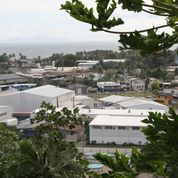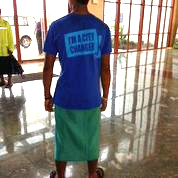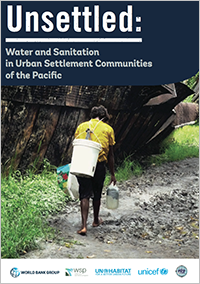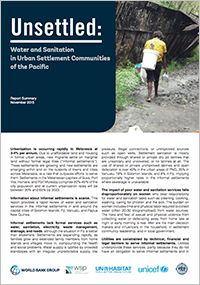Background and Objectives
Background

Rapid urbanization is a phenomenon shared by all Pacific Island countries. As of 2013 there were 10,565,837 people in the Pacific region, with the population of individual cities ranging from 254,158 in Port Moresby, Papua New Guinea, to just 1,497 in the small urban centre of Yaren, Nauru. In half of the United Nations (UN) member Pacific Island countries, the majority of people already live in urban areas, and this proportion will only increase in the future. As Pacific Island economies have developed, an increasing share of national wealth (GDP) is produced in urban areas. Urban economic activities have also strengthened the viability of rural economic development by providing markets, agro-industrial production, processing centres and trans-shipment points for rural produce.
However, the sheer speed and impact of the transformation, and the inadequate legal and planning frameworks currently in place to manage this growth, have led to relentless urban expansion, intensive energy use, widening inequality, limited livelihood opportunities and increasing vulnerability to climate change impacts. As a result, there is an urgent need to promote an urbanization model in the Pacific that is people-centred and harnesses balanced development to ensure more equitable service delivery and improve the quality of life for all citizens.
Objectives
The overall objectives of this project are to strengthen capacity for urban development and settlement upgrading, build a regional knowledge base to help individual countries in meeting their commitments to the PUA and associated national goals, facilitate and integrate policy discussions into regional and national planning, and strengthen monitoring of the implementation of the PUA. The Regional Support project is implemented through five components:
- 1:Regional needs assessment and analysis;
- 2:Institutional strengthening through targeted training;
- 3:Urban knowledge creation and management;
- 4:Policy learning dialogues on Pacific urbanization;
- 5:Capacity development in monitoring urban initiatives under the Pacific Plan.
Activities

In the short term, the project will increase the exposure of policy makers, planners and other urban actors to targeted training and policy dialogue on key activities such as City Development Strategies and Slum Upgrading Strategies, and promote the development of practical toolkits and dissemination of good practices. Parallel to this will be a focus on strengthening the capacity of countries and agencies to better respond to and integrate the PUA into national and regional plans, and monitor implementation using quantifiable data. It is hoped that it will encourage more coherent and collaborative efforts from development partners to address urbanization issues.
In the longer term, the project will support the upscaling and replication of key processes such as City Development Strategies and Slum Upgrading Strategies, and help guide the formulation of effective and well resourced policies. This should lead to better functioning and more efficient urban areas which address the needs of the urban poor and contribute to the broader economic, social and environmental development of the nation.
Results
Capacity Building: A Toolbox USB (containing materials on development strategies, settlement upgrading, urban sector profiling, climate change, infrastructure financing and financial management) consolidated with outputs from Cities Alliance, the UN Human Settlements Programme (UN-Habitat), the Asian Coalition for Housing Rights (ACHR) and other global/regional partners is a valuable resource for stakeholders. To implement capacity development and institutional strengthening, UN-Habitat has supported a number of events and other training opportunities covering issues such as housing policy, climate change adaptation, urban planning, land readjustment and land based financing.
Policy Learning Dialogues: Responding to country requests for more peer learning exchanges supported by global good practices, a number of regional urban fora were designed to maximize collaboration through inter-country knowledge sharing. For example, the regional support project facilitated a Pacific Housing Workshop in 2012 that assisted countries in developing a better understanding of the scope of national housing policies, including the steps involved in their formulation and the identification of key issues and concerns (such as land, finance and planning).
Educational Outreach: In 2013, in collaboration with the United Nations Development Programme (UNDP), the Office of the High Commissioner for Human Rights (OHCHR) and the University of the South Pacific, a workshop on ‘Promoting the Right to Adequate Housing in Melanesia’ was held with the support of the Pacific Media Assistance Scheme (PACMAS) to educate journalists on the role of the media in raising public awareness and facilitating policy debate on key housing challenges in the sub-region.
Urban Knowledge Creation and Management: A literature review and survey of national urban partners and knowledge platforms helped inform the development of an integrated mechanism to capture, share and disseminate lessons learned. Specific areas of interest for Pacific Island Countries were also identified, including housing policy, urban resilience, finance for urban investments and improved planning and management for increased service efficiency. The documentation of good practices is being shared between UN-Habitat, the ESCAP Pacific Office and the Commonwealth Local Government Forum (CLGF), and disseminated through established networks. The use of social media on Pacific urban issues is also increasingly popular and helps catalyze interest among practitioners, researchers and development partners.
Related documents:
- Fifth Pacific Urban Forum (PUF5), July 2019
- Milestone report on “Sanitation, Drinking water and Health in Pacific Island countries” reveals troubling information
- Pacific Urban Forum - Harnessing Opportunities in a Post-2015 Environment
- Fiji:Participatory Slum Upgrading Programme (PSUP) in Fiji
- Papua New Guinea Settlement Upgrading Programme
- Papua New Guinea: Urban Governance Support Programme
- Papua New Guinea: Safer Port Moresby Initiative (Completed)
- Samoa City Development Strategy
- Solomon Islands: Participatory Slum Upgrading Programme (PSUP) in Solomon Islands
- Tuvalu:Participatory Slum Upgrading Programme (PSUP) in Tuvalu
- Vanuatsu: Participatory Slum Upgrading Programme (PSUP) in Vanuatu
- Regional Institutional Strengthening and Knowledge Management Support to Pacific Island Countries to Strengthen Implementation of the Pacific Urban Agenda under the Pacific Plan








































